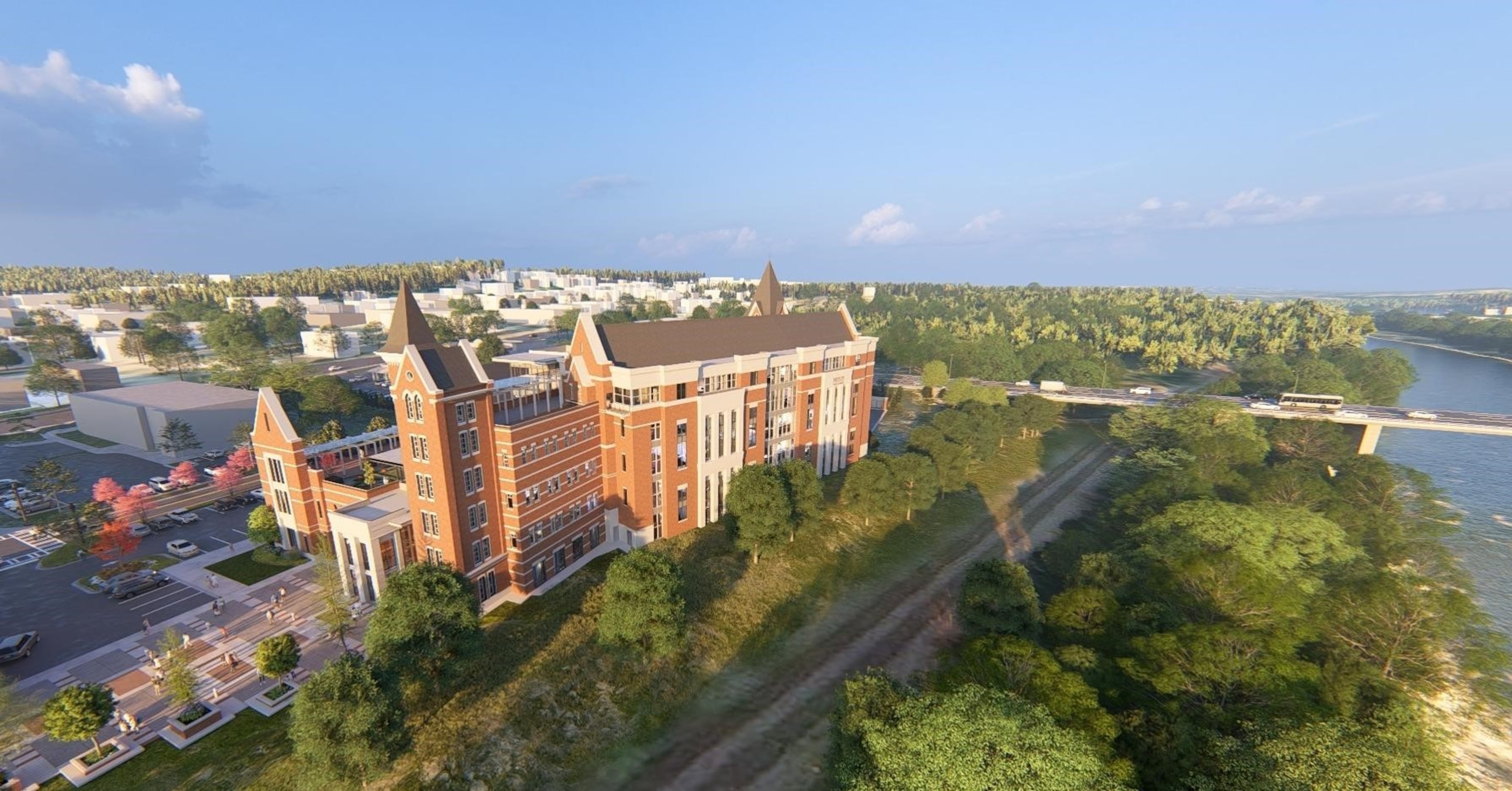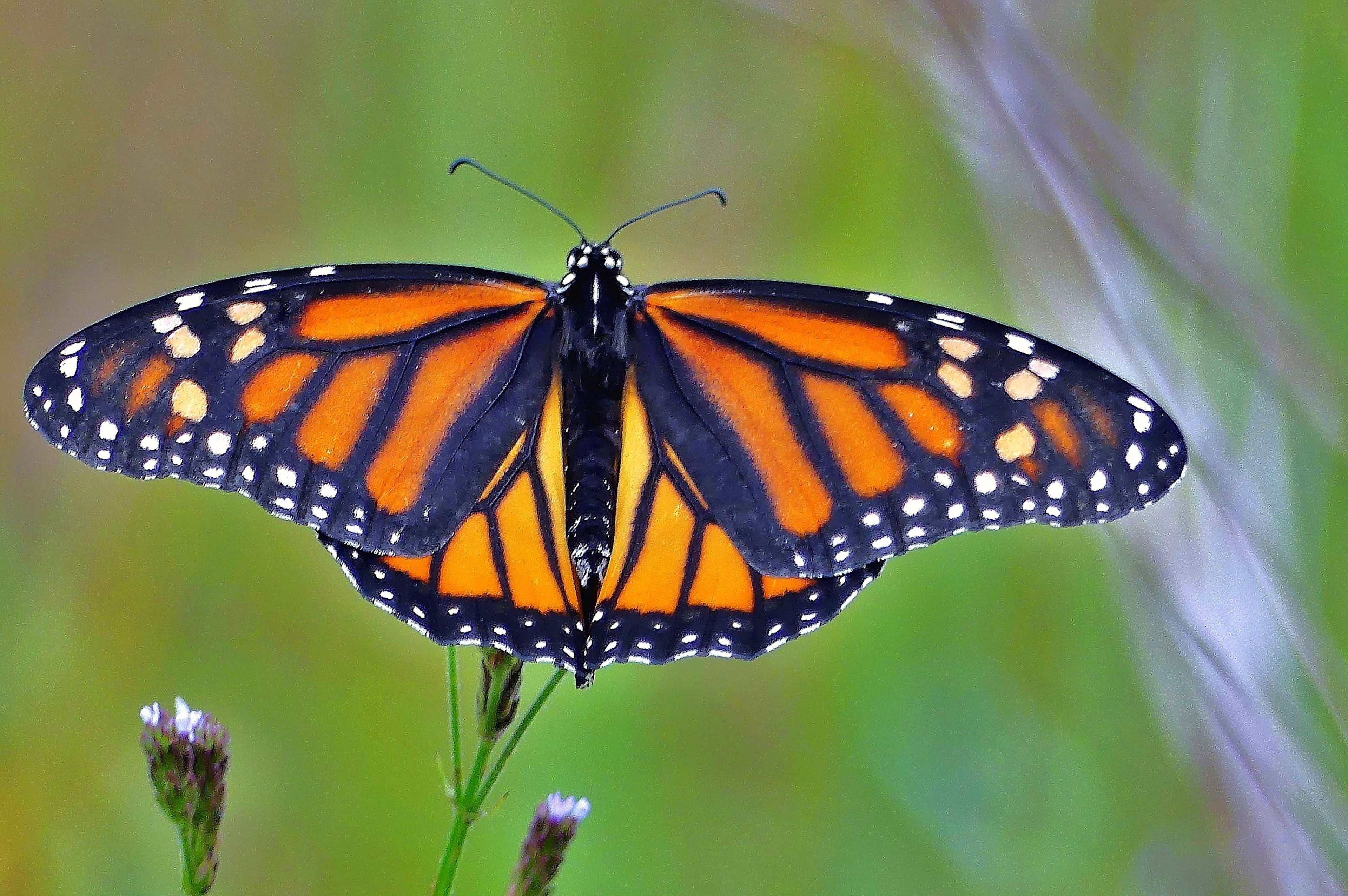How an ex-Texan and a university helped change the face of a Georgia city

MACON — At the foot of downtown here on a long-vacant triangle of land between a dog park and a Burger King near the banks of the Ocmulgee River, Bill Underwood spoke of renewal.
He was, at 69 and in his final weeks as Mercer University’s president, standing before a few hundred civic and business leaders on a recent sunbaked morning. He was a touch more silver-haired than when he arrived to take the reins at Mercer in 2006, back when he was an unknown in these parts, the son of a Baptist preacher, a lawyer from Texas, where he had served as interim president of Baylor University.
Now, two decades on, he talked revival. Mercer was breaking ground on an $80-million-plus, 150,000-square-foot-plus medical school complex that will overlook the river and I-16. It will rise on property that has in recent decades been a hole in the heart of the city.
Soon-to-come nearby retail, office and loft space along with a new city convention center and a pair of hotels are, in coming years, expected to inject hundreds of millions more dollars in public and private investment. All of it within a few blocks of Macon’s already revitalized business, shopping and entertainment district.

Underwood has long mastered the trial lawyer’s manner of winning a jury — or a crowd — with brevity, a hard truth or two and a dash of humor. As he unveiled publicly Mercer’s expansion into downtown, he also drew on the unassuming skills that helped him win over locals.
“Truthfully, there was no plan. … I had no idea how we were going to do this,” he told the riverside gathering in November at the most expensive construction project Mercer has ever undertaken. “Now that I’m leaving, I can admit to the (Mercer) trustees who are here that I really had no idea how.”
There was laughter.
“But one thing I did know,” Underwood went on, “is that if you don’t try it’s not gonna happen.”
That has been William D. Underwood’s gift to Macon, that he wasn’t afraid to take chances. And take them he has.

As he prepares to step down as Mercer’s president at the end of December, to be succeeded by Penny L. Elkins, Underwood is widely credited for having expanded the private university at a time when many small and midsized universities are navigating declining enrollment, higher costs and rising competition.
Since Underwood’s arrival nearly two decades ago, Mercer’s annual student enrollment has risen to about 9,200 from 7,000, its endowment has more than doubled to top $500 million and its sports programs have on more than one occasion vaulted to the national spotlight.
The 6-foot-4 Texan also has enlarged the nearly 200-year-old university’s stamp on Macon. About $300 million in Mercer-led ventures around the campus and downtown Macon during his tenure have helped refresh parks, revive the renowned Capricorn Studios and build a retail-and-student-living complex known as Mercer Village along what was a decaying avenue into the city.
Mercer’s influence is also felt farther afield after the university’s medical school, with a nudge from Jimmy Carter, opened rural clinics in different corners of Georgia under Underwood’s stewardship.
“People use the word bold all the time — taking bold steps, not being afraid to fail. But he’s confident in the brand, the Mercer brand, the Macon brand,” said Lester Miller, Macon’s current mayor, the third to have worked with Underwood.

Football on ESPN and Duke basketball upset
On a muggy late-August night in downtown Montgomery, Alabama, Underwood strolled the sidelines of the Cramton Bowl, a 21,000-seat football stadium.
Mercer’s Bears were squaring off against the University of California, Davis, in an early-season, neutral-site matchup televised by ESPN. The stands were all but empty. An electrical storm was brewing, trawling down the state from Birmingham, and the crowd, already sparse — maybe a couple of thousand strong, if that — would soon scurry for cover. But never mind the in-person attendance.
A dozen years after Underwood engineered the return of Mercer’s football program, dormant since World War II, the Bears were on national TV, in prime time, drawing that night an average viewership of 422,000. Nothing eye-popping, but on a somewhat quiet Saturday of sports, Mercer, for a couple of hours in its first game of the season, took center stage.
As the season has played out, with the Bears recently clinching their second straight Southern Conference title and a third berth in the FCS playoffs, the program has become a fixture on the sporting scene.
Former Macon Mayor Robert Reichert, in office from 2007 until 2020, a term largely mirroring Underwood’s tenure, said Underwood was “entrepreneurial enough to take risks,” and football may have been the largest of all.
“Everything doesn’t have to be a slam dunk to succeed before he’ll do it,” Reichert said. “When he arrived, the trustees of the university were divided over whether or not to get back into football. Some felt like it was just a black hole for money and a diversion from education. … He listened and listened but then he made his decision.”

Sporting success has elevated the school’s profile. Mercer toppled basketball blue-blood Duke in the NCAA basketball tournament in 2014, an upset that reverberates to this day, spreading the Mercer brand. A Mercer baseball alum, Kyle Lewis, was the American League Rookie of the year in 2020.
The school’s on-campus football stadium, completed in 2013, and development around it also have breathed life into a once-faded corridor into downtown from I-75.
“In our culture, for better or worse, if you’re trying to build community, sports may be the best way to do it,” Underwood said in an interview. “People get together and they pull for the same thing; people that probably wouldn’t agree on anything else will, for those three hours on a Saturday afternoon, pull for the same thing.”

An email from Jimmy Carter
The Jimmy Carter story is one of Underwood’s favorites. On a recent morning in his office, he told it again because it articulates the Mercer medical school’s mission — and the broader university’s commitment to outreach — to provide rural Georgia with Mercer-trained doctors.
The school now has clinics in Sumter, Clay, Harris, Putnam and Taylor counties and also on Jekyll Island.
But while those entities were in the incubation stage in April 2018, Carter, a Mercer trustee who was 93 at the time, informed Underwood that Carter’s hometown of Plains had lost its only doctor. “Can you help us find a doctor?” he asked.
Underwood said he would.
Underwood recalled that Carter “was so impatient. … He was a great man, but so impatient.”
Ten days later, Carter e-mailed Underwood: “Bill, where’s our doctor?”
Save for the signature, “Jimmy,” that was all the email said.
Underwood called the med school dean. “We need to get a move on.”
School administrators had already discussed creating a network of rural health clinics.
“Why don’t we start in Plains?” Underwood told them.
Six weeks later, the clinic opened.

‘The most apolitical guy that I know’
Two decades ago when Underwood, who’d gone to high school and college in Michigan before moving to Oklahoma and then Texas, considered moving to Georgia, he knew little about Macon.
“But I came to visit,” he said, “and I thought, ‘This could be a really good place.’ … I think Macon is the best place to live in the state. If you’d asked me when I was moving to Mercer, I probably would not have speculated that Macon was going to be my favorite place I’ve ever lived, and it is.”
Jack Ellis was the city’s mayor for the first couple of years after Underwood arrived.
“He is the most apolitical guy that I know,” Ellis said. “I don’t know if he’s Republican or Democrat. I don’t know whether he leans left or he leans right. He’s just all about Mercer University and what is good for Mercer and the city of Macon. … I think he’s just a fair man.”

Miller, the current mayor, figures he and Underwood and their teams have done “multiple decades of work in just the last three or four years,” perhaps most notably their collaboration on the riverfront medical school complex.
Of the undertaking, Underwood said, “I think people are going to begin thinking of Macon in a different way. I think reputations lag reality, and I think our reality is pretty good in Macon today. But I think this will speed up the process of our reputation matching our reality.”
‘Something we didn’t have’
On a Saturday in late October, Underwood, in beige khakis and a black polo emblazoned with an orange Mercer “M,” strode through a sea of football tailgaters.
Mercer was hosting Virginia Military Institute. A party-tent city encircled a concert stage flanked by a giant-screen TV airing ESPN’s “College GameDay.”
Even in dark sunglasses, Underwood was unmissable. He had long ago become the face of the school, a presence who looms larger than the 10-foot-tall, 2,200-pound bronze bear statue at the center of campus.
With a clear plastic cup of unsweet iced tea in hand, he soaked in a pregame scene that is the envy of any in the Southern Conference, a scene no one here could have imagined 20 years ago.

A woman he recognized from a local pizzeria marched up.
“How’s retired life been to you?” she asked.
“Well,” he said, “I’m not retired.”
Last spring, news emerged that Underwood was, at year’s end, stepping down as president, but that he would assume a teaching post at the law school. A lot of folks didn’t read far enough to see that he wasn’t quitting work.
“You’re not retired?” the woman said, surprised. “You’re staying?”
“I’m just going to another job,” he said.
Another Mercer fan appeared and shook Underwood’s hand. The fan gushed that he’d heard from people around town that “Macon has never been as good in the last 50 years” and that “Mercer has been a huge part of it.”
Underwood, measured and unassuming as ever, said, “Macon’s great. I’ll agree with you on that.”
Then came another fan: “Thank you for everything you do.”
Before heading across campus to another engagement — the men’s soccer team was playing and Underwood needed to greet some of the squad’s supporters — he lingered among the tailgaters.
For a moment, though he wouldn’t put it quite this way, he basked in a creation of his own making.
“I love this,” Underwood said. “This is something we didn’t have when I got here.”



